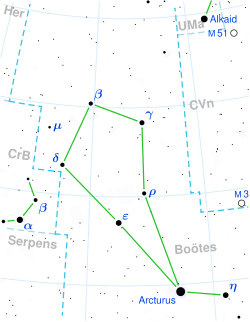|
うしかい座ι星
ι Boötis
|
| 星座
|
うしかい座
|
| 見かけの等級 (mv)
|
4.75[1]
(4.73 - 4.78[2])
|
| 変光星型
|
たて座δ型[2]
|
位置
元期:J2000.0
|
| 赤経 (RA, α)
|
14h 16m 09.92995s[3]
|
| 赤緯 (Dec, δ)
|
+51° 22′ 02.0267″[3]
|
| 視線速度 (Rv)
|
-16.9 km/s[4]
|
| 固有運動 (μ)
|
赤経: -149.39 ミリ秒/年[3]
赤緯: 88.72 ミリ秒/年[3]
|
| 年周視差 (π)
|
34.40 ± 0.19ミリ秒[3]
(誤差0.6%)
|
| 距離
|
94.8 ± 0.5 光年[注 1]
(29.1 ± 0.2 パーセク[注 1])
|
| 絶対等級 (MV)
|
2.40[5]
|
|
|
うしかい座ι星の位置(丸印)
|
| 物理的性質
|
| 半径
|
1.6 R☉[6]
|
| 質量
|
1.81 M☉[7]
|
| 表面重力
|
13 G[5][注 2]
|
| 自転速度
|
135 km/s[5]
|
| スペクトル分類
|
A7 V[7]
|
| 光度
|
9.5 L☉[5]
|
| 表面温度
|
7,700 K[4]
|
| 色指数 (B-V)
|
0.20[1]
|
| 色指数 (U-B)
|
0.06[1]
|
| 色指数 (R-I)
|
0.09[1]
|
| 金属量[Fe/H]
|
0.08[5]
|
| 年齢
|
5.0 ×107 年[7]
|
| 他のカタログでの名称
|
| アセルス・セクンドゥス[8], うしかい座21番星, BD+52 1784, FK5 528, HD 125161, HIP 69713, HR 5350, SAO 29071, GJ 9474 A, WDS J14162+5122A
|
|
| ■Template (■ノート ■解説) ■Project
|
うしかい座ι星(ι Boötis、ι Boo)或いはうしかい座21番星(21 Boötis、21 Boo)は、うしかい座にある連星である。地球からは、約95光年離れたところにある。
名称
ラテン語でロバの2番仔のを意味するアセルス・セクンドゥス(Asellus Secundus)という固有名も持っている[9]。
うしかい座ι星は、「ロバの仔」と称される他の2つの恒星、うしかい座θ星とうしかい座κ星も含め、「ハイエナの仔」を意味するAulād al Dhiʼbah(أولاد الضّباع - aulād al dhiʼba)という星列の一部であった[8]。
中国では、うしかい座ι星は天槍二(拼音: Tiān Qiāng èr)即ち天槍という星官の2番星と呼ばれている[10][11]。
星系
うしかい座ι星は、約39秒離れた位置にあるHD 234121と、連星系を形成している[7]。
主星である白色のA型主系列星がうしかい座ι星で、視等級が4.75である[1]。うしかい座ι星は、20世紀前半から明るさが変化すると言われていたが、1980年にたて座δ型変光星の捜索の中で変光星であることが確かめられ、そのままたて座δ型変光星に分類された[16][17]。明るさは概ね4.73から4.78等級の間で変化し、変光の周期は約38分で安定している[2][6]。
伴星のHD 234121は、視等級が7.33で、K1型の主系列星とされる[12][15]。うしかい座ι星とは、固有運動が共通しており、重力的に結び付いた真の連星と考えられる[12]。うしかい座ι星との間は、およそ1,100AU離れており、公転周期は2万年以上になるとみられる[7][18]。
ワシントン重星カタログには更に、第3の天体として、90秒離れた位置の14等星が収録されている[19]。こちらは、固有運動の違いから見かけ上の重星に過ぎないとみられる[20]。
脚注
注釈
- ^ a b c d パーセクは1 ÷ 年周視差(秒)より計算、光年は1÷年周視差(秒)×3.2615638より計算
- ^ 出典での表記は、
![{\displaystyle \log g[{\mbox{cgs}}]=4.10}](https://wikimedia.org/api/rest_v1/media/math/render/svg/41f813e207e3c74d4b8f74cd78f956390445e0d4)
出典
- ^ a b c d e Hoffleit, D.; Warren, W. H., Jr. (1995-11), “Bright Star Catalogue, 5th Revised Ed.”, VizieR On-line Data Catalog: V/50, Bibcode: 1995yCat.5050....0H
- ^ a b c Samus, N. N.; et al. (2009-01), “General Catalogue of Variable Stars”, VizieR On-line Data Catalog: B/gcvs, Bibcode: 2009yCat....102025S
- ^ a b c d e “iot Boo -- Variable Star of delta Sct type”. SIMBAD. CDS. 2018年3月3日閲覧。
- ^ a b Fossati, L.; et al. (2008-07), “Abundance analysis of seven δ Scuti stars”, Astronomy & Astrophysics 485 (1): 257-265, Bibcode: 2008A&A...485..257F, doi:10.1051/0004-6361:200809541
- ^ a b c d e Paunzen, E.; et al. (2002-09), “On the Period-Luminosity-Colour-Metallicity relation and the pulsational characteristics of lambda Bootis type stars”, Astronomy & Astrophysics 392: 515-528, Bibcode: 2002A&A...392..515P, doi:10.1051/0004-6361:20020854
- ^ a b Kiss, L. L.; et al. (1999-04), “On the monoperiodicity of the suspected delta Scuti star ι Bootis”, Information Bulletin on Variable Stars 4698: 1, Bibcode: 1999IBVS.4698....1K
- ^ a b c d e f De Rosa, R. J.; et al. (2014-01), “The VAST Survey - III. The multiplicity of A-type stars within 75 pc”, Monthly Notices of the Royal Astronomical Society 437 (2): 1216-1240, arXiv:1311.7141, Bibcode: 2014MNRAS.437.1216D, doi:10.1093/mnras/stt1932
- ^ a b Allen, Richard Hinckley (1963), “Boötes”, Star Names: Their Lore and Meaning, New York: Dover Publications, Inc., p. 105, ISBN 0-486-21079-0, https://penelope.uchicago.edu/Thayer/E/Gazetteer/Topics/astronomy/_Texts/secondary/ALLSTA/Bootes*.html 2018年3月3日閲覧。
- ^ Jim Kaler. “Asellus Secundus (Iota Bootis)”. University of Illinois. 2018年3月3日閲覧。
- ^ “Constellations and Myths”. 香港太空館. 2023年10月3日閲覧。
- ^ (中国語)“AEEA 天文教育資訊網 中國古代的星象系統 (45): 天槍、玄戈、三公”. 國立自然科學博物館 (2006年6月14日). 2018年3月3日閲覧。
- ^ a b c Lépine, Sébastien; Shara, Michael M. (2005-03), “A Catalog of Northern Stars with Annual Proper Motions Larger than 0.15" (LSPM-NORTH Catalog)”, Astronomical Journal 129 (3): 1483-1522, Bibcode: 2005AJ....129.1483L, doi:10.1086/427854
- ^ a b c d e f “HD 234121 -- High proper-motion Star”. SIMBAD. CDS. 2018年3月3日閲覧。
- ^ Pasinetti Fracassini, L. E.; et al. (2001-02), “Catalogue of Apparent Diameters and Absolute Radii of Stars (CADARS) - Third edition - Comments and statistics”, Astronomy & Astrophysics 367: 521-524, Bibcode: 2001A&A...367..521P, doi:10.1051/0004-6361:20000451
- ^ a b c López-Santiago, J.; et al. (2010-05), “A high-resolution spectroscopic survey of late-type stars: chromospheric activity, rotation, kinematics, and age”, Astronomy & Astrophysics 514: A97, Bibcode: 2010A&A...514A..97L, doi:10.1051/0004-6361/200913437
- ^ Albert, Jim (1980-10), “A Sky Survey for δ Scuti Stars”, Journal of the American Association of Variable Star Observers 9 (1): 20-29, Bibcode: 1980JAVSO...9...20A
- ^ Kholopov, P. N.; et al. (1985-03), “The 67th Name-List of Variable Stars”, Information Bulletin on Variable Stars 2681: 1, Bibcode: 1985IBVS.2681....1K
- ^ Rodriguez, David R.; et al. (2015-05), “Stellar multiplicity and debris discs: an unbiased sample”, Monthly Notices of the Royal Astronomical Society 449 (3): 3160-3170, Bibcode: 2015MNRAS.449.3160R, doi:10.1093/mnras/stv483
- ^ Mason, Brian D.; et al. (2018-01), “The Washington Visual Double Star Catalog”, VizieR On-line Data Catalog: B/wds, Bibcode: 2018yCat....102026M
- ^ Zacharias, N.; et al. (2013-02), “The Fourth US Naval Observatory CCD Astrograph Catalog (UCAC4)”, Astronomical Journal 145 (2): 44, Bibcode: 2013AJ....145...44Z, doi:10.1088/0004-6256/145/2/44
関連項目
外部リンク
座標:  14h 16m 09.92995s, +51° 22′ 02.0267″ 14h 16m 09.92995s, +51° 22′ 02.0267″
|

![{\displaystyle \log g[{\mbox{cgs}}]=4.10}](https://wikimedia.org/api/rest_v1/media/math/render/svg/41f813e207e3c74d4b8f74cd78f956390445e0d4)